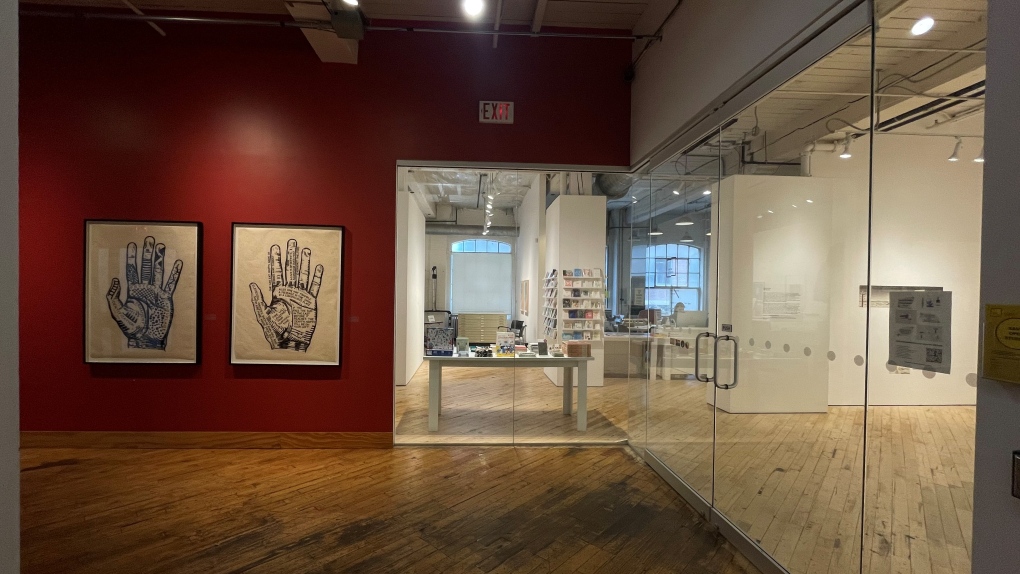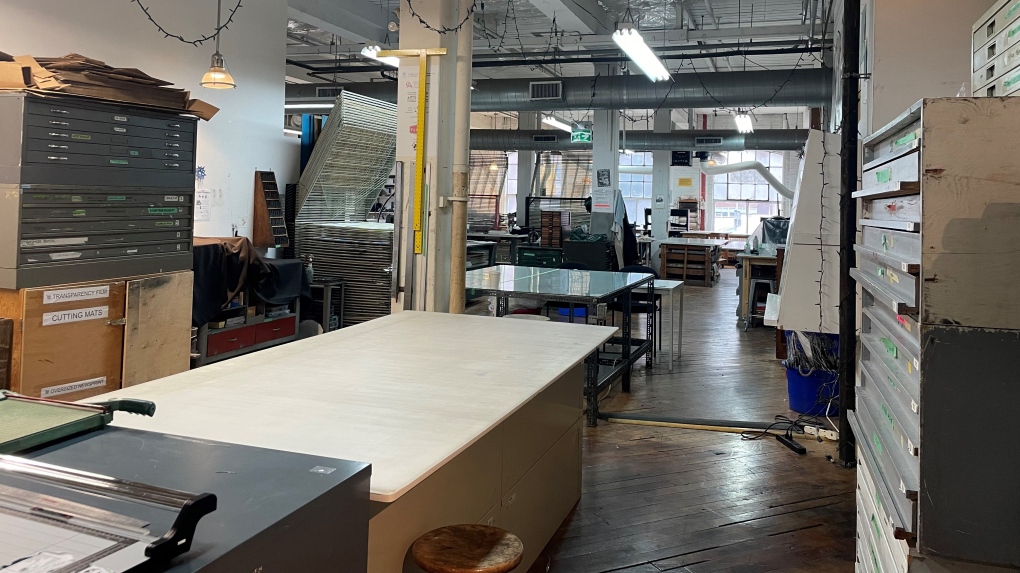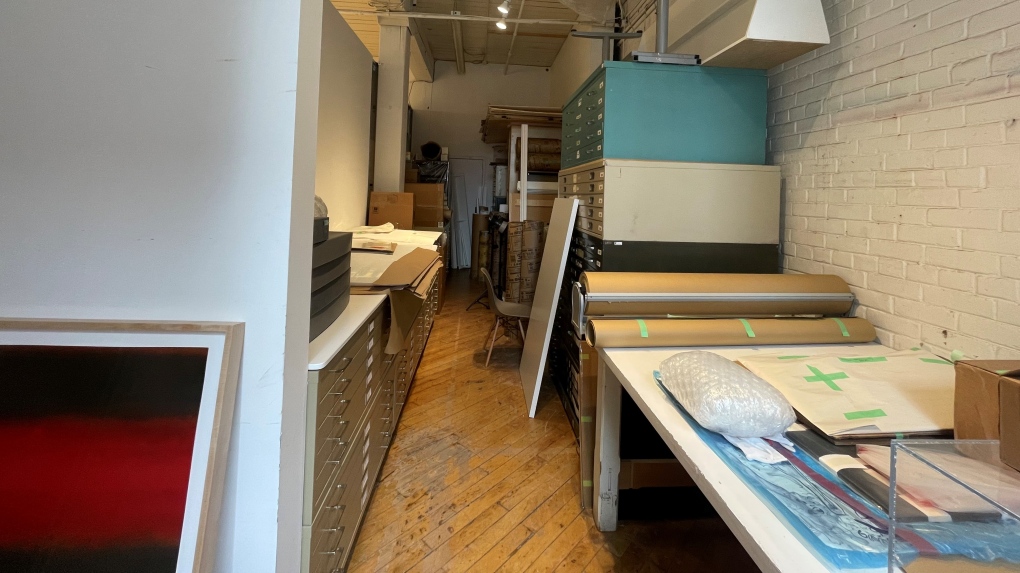Toronto studio to temporary close, displacing dozens of artists
 Arjun Achuthan (left) and Isabel Diaz Catoni (right) are printmakers and members of the studio. There are dozens of members who will be displaced amid the studio's temporary re-structure from June 28, 2024 to January 2025 while the space downsizes and restructures. (Brooklyn Connolly / CTV News Toronto)
Arjun Achuthan (left) and Isabel Diaz Catoni (right) are printmakers and members of the studio. There are dozens of members who will be displaced amid the studio's temporary re-structure from June 28, 2024 to January 2025 while the space downsizes and restructures. (Brooklyn Connolly / CTV News Toronto)
A printmaking studio that has been in Toronto since 1970 might close in the coming months, displacing dozens of artists.
In a letter published to its website, Open Studio says that it is “months away” from closing permanently due to economic pressures and financial cuts since the COVID-19 pandemic.
The studio is located inside 401 Richmond Street, a hertiage-designated industial space. It was established as an artist-run centre that provides studio space for printmakers with expert help as required. It offers courses in printmaking and has residency opportunities host’s artist talks and has art exhibitions in its front of house.
 Open Studio, located at 401 Richmond Street West, is one of the only printmaking studios in Toronto of it's size and is where 63 artists work. (Brooklyn Connolly / CTV News Toronto).
Open Studio, located at 401 Richmond Street West, is one of the only printmaking studios in Toronto of it's size and is where 63 artists work. (Brooklyn Connolly / CTV News Toronto).
“Uniqueness is one of the reasons we’ve had to stay alive,” Pat Macaulay, the studio’s executive director said in an interview with CTV News Toronto.
Macaulay explained that the studio’s main revenue streams are print sales, artist merchandise sales, and revenue from its monthly memberships. The studio currently has over 160 active members and is the only artist-run printmaking studio in the city that provides a large range of facilities.
However, they’ve been operating with a $80,000 deficit for at least the last year.
 Open Studio's studio space includes 7,200 sq/ft of space and equipment for its members to use. It has been in the community for almost 55-years, since the 1970s and will be temporarily closing to restructure and downsize this year. (Brooklyn Connolly / CTV News Toronto).
Open Studio's studio space includes 7,200 sq/ft of space and equipment for its members to use. It has been in the community for almost 55-years, since the 1970s and will be temporarily closing to restructure and downsize this year. (Brooklyn Connolly / CTV News Toronto).
As a way to adapt the studio has plans to close temporarily close its studio space on June 28 so that it can restructure and reimagine its operations, according to the letter sent to members.
During that time, its front-of-house operations, including exhibits and merchandise sales, will remain open. However, artists will not be able to use the space to create works.
The facility would then reopen in January of next year in time for its 55th anniversary.
The studio has a goal of raising $75,000 in donations to sustain operations until the end of June, and has raised 74 per cent of that goal as of March 21, 2024.
“We have been severely impacted by funding cuts, the pandemic, and the rising cost of maintaining our 7,200 square foot space in downtown Toronto,” the letter to members reads. “We recognize the loss of our space and programming would be deeply felt and would immensely affect our current and former members, countless artists, and the broader arts community we have worked with for 54 years. For this reason, we are determined to not give up on Open Studio.”
 This is one of the two areas that Pat Macaulay says will be downsized. It's where an archive of originally 10,000 prints were stored before being downsized to 2,000 after returning some of its collection back to artists (Brooklyn Connolly / CTV News Toronto)
This is one of the two areas that Pat Macaulay says will be downsized. It's where an archive of originally 10,000 prints were stored before being downsized to 2,000 after returning some of its collection back to artists (Brooklyn Connolly / CTV News Toronto)
The planned temporary closure of Open Studio comes at a time when many other arts organization in the city are struggling.
Just last week officials with the Hot Docs film festival said that the future of that event was at risk, in part due to lingering impacts from the COVID-19 pandemic.
The Just for Laughs comedy festivals in both Toronto and Montreal have also been scrapped for this year due to financial impacts.
Kelly Langgard, director and CEO of Toronto Arts Council, says that while the pandemic is over for many people, arts participants and organizations are “still feeling the impacts.”
She said that while she is hopeful as many organizations as possible survive, she recognizes that not all will “make it through this time.”
“We’re seeing organizations approaching their programming in different ways, trying to bring in audience members in, in different ways,” she said. “A number of arts organizations pivoted in the beginning of the pandemic and started offering programming online to bring in more audience and audience members and that’s something that many are still doing. What we’re also seeing is other organizations sharing resources with other arts organizations or other entities and just trying different ways to maximize their impact and adapt to the changing audience patterns and situations.”
The Toronto Arts Council is the city’s funding body for artist and arts organizations. Its grants lead to exhibitions, performances, readings and workshops seen by over five million people across the city each year.
In the two-years following the pandemic, it received $25 million in allocated funding. This year, the gross operating budget for the arts is $52.1 million, and serves arts and culture organizations, artists, event organizers, residents and visitors.
- READ MORE: One-of-a-kind dedicated Black arts hub aims to increase access for Black creatives in Canada
“Toronto is a city that’s known for its strong arts and culture scene,” Langgard said. “And, you know, there are many, many artists and arts organizations working in the city that are doing excellent work, that are innovating that are really bringing so much value to the city, both in terms of economic value, but also in terms of creating an environment where the city is a vibrant and engaging place to live.”
CTVNews.ca Top Stories

Trudeau's 2024: Did the PM become less popular this year?
Justin Trudeau’s numbers have been relatively steady this calendar year, but they've also been at their worst, according to tracking data from CTV News pollster Nik Nanos.
Back on air: John Vennavally-Rao on reclaiming his career while living with cancer
'In February, there was a time when I thought my career as a TV reporter was over,' CTV News reporter and anchor John Vennavally-Rao writes.
The winter solstice is here, the Northern Hemisphere's darkest day
The winter solstice is Saturday, bringing the shortest day and longest night of the year to the Northern Hemisphere — ideal conditions for holiday lights and warm blankets.
Death toll in attack on Christmas market in Germany rises to 5 and more than 200 injured
Germans on Saturday mourned both the victims and their shaken sense of security after a Saudi doctor intentionally drove into a Christmas market teeming with holiday shoppers, killing at least five people, including a small child, and wounding at least 200 others.
Poilievre writes to GG calling for House recall, confidence vote after Singh declares he's ready to bring Liberals down
Conservative Leader Pierre Poilievre has written to Gov. Gen. Mary Simon, imploring her to 'use your authority to inform the prime minister that he must' recall the House of Commons so a non-confidence vote can be held. This move comes in light of NDP Leader Jagmeet Singh publishing a letter stating his caucus 'will vote to bring this government down' sometime in 2025.
Overheated immigration system needed 'discipline' infusion: minister
An 'overheated' immigration system that admitted record numbers of newcomers to the country has harmed Canada's decades-old consensus on the benefits of immigration, Immigration Minister Marc Miller said, as he reflected on the changes in his department in a year-end interview.
School custodian stages surprise for Kitchener, Ont. students ahead of holiday break
He’s no Elf on the Shelf, but maybe closer to Ward of the Board.
Kelly Clarkson's subtle yet satisfying message to anyone single this Christmas
The singer and daytime-talk show host released a fireside video to accompany her 2021 holiday album, “When Christmas Comes Around” that she dubbed, “When Christmas Comes Around…Again.
Pope Francis reprimands Vatican staff for gossiping in annual Christmas message
Pope Francis told Vatican bureaucrats on Saturday to stop speaking ill of one another, as he once again used his annual Christmas greetings to admonish the backstabbing and gossiping among his closest collaborators.


































